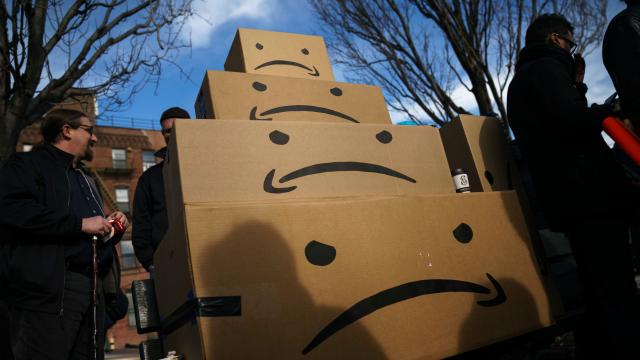The everything store appears to have a serious expired foods problem.
A lengthy report from CNBC, in partnership with data analytics firm 3PM, published Monday found that Amazon is “littered” with listings for consumer products that are far past their sell-by dates. According to the report, the system is creating products not only for consumers who are receiving spoiled or inedible food ordered through the tech giant — included baby formula, creamers and beef jerky — but for the brands of those products that are left with little recourse for dealing with frustrated customers and damaged reputations, despite those items being sold by third-party merchants.
In assessing the site, reading through reviews, and speaking directly with customers who received rancid or expired products, CNBC uncovered a disturbing number of reports related to products that had been sold months after their sell-by dates. As one example, the site pointed to a featured Amazon listing for Fiji water bottles with dozens of reviews that claim the bottles arrive damaged or misshapen and that the contents taste like tap water. Most of these reviews insist the shipments are fake, rather than authentic Fiji bottled water.
As another example, CNBC pointed to a listing for Teavana Beach Bellini tea bearing “not for resale” language on the packaging and with multiple reviews claiming the tea had “chemical” odour. One reviewer compared the smell to nail polish remover. As CNBC noted, Teavana’s parent company Starbucks announced in 2017 that it was closing all of its 379 Teavana stores. CNBC reported that liquidation sales can lead to expired products winding up on Amazon.
When reached for comment about the “not for resale” language on the back in images of the tea on the site, a spokesperson told Gizmodo that every product sold by Amazon must comply with applicable laws and the company’s policies, including those marked not for resale.
The issue is evidently worse than a smattering of a few bad products here or there. According to CNBC, 3PM looked at 100 top-selling food items on the site and discovered that at least 40 per cent of those had five or more reviews about the items being expired.
In a statement by email, a spokesperson for Amazon said that the company requires third-party sellers to “abide by strict product quality guidelines” and said that the company has “proactive processes,” which include both AI and human review systems, in effect to check products’ expiration dates.
“If we find a product doesn’t meet our guidelines, we remove it from sale and take appropriate action against the seller, which may include removal of their account,” the spokesperson said. “If customers have concerns about items they’ve purchased, we encourage them to contact our Customer Service directly to investigate and take appropriate action… With the A-to-Z Guarantee, customers are protected and will receive a refund if they have issues with a product, whether they make a purchase from Amazon or a third-party seller.”
But reports on Amazon’s marketplace suggest that the company needs to do more to police the sale of items on its site. In August, the Wall Street Journal reported that it identified 4,152 products for sale on the site that are either fraudulently labelled or were deemed unsafe or banned by federal regulators. Once flagged to Amazon by the paper, the Journal said that 57 per cent of those items it found either had their descriptions changed or were removed from sale.
In the company’s statement, the Amazon spokesperson said that the company’s “top priority is ensuring customers receive safe, high-quality products” when they place an order through the site. But taken together, these two reports seem to indicate that Amazon would much rather profit now and apologise later than deliver on that claim.
Oh, and you might want to check the date on that tea you just ordered.
